Se ha desvelado cuál será la portada de The Splinter King, la segunda entrega de la saga The God-King Chronicles, que Orbit publicará en julio.
La portada es obra Anato Finnstark con diseño de Matthew Burne.
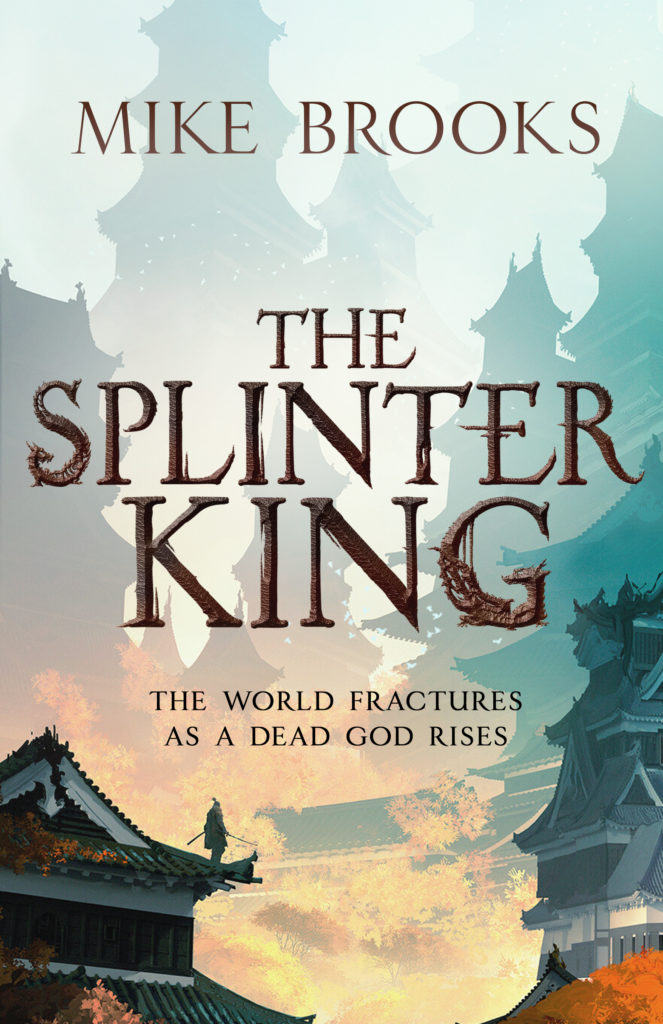
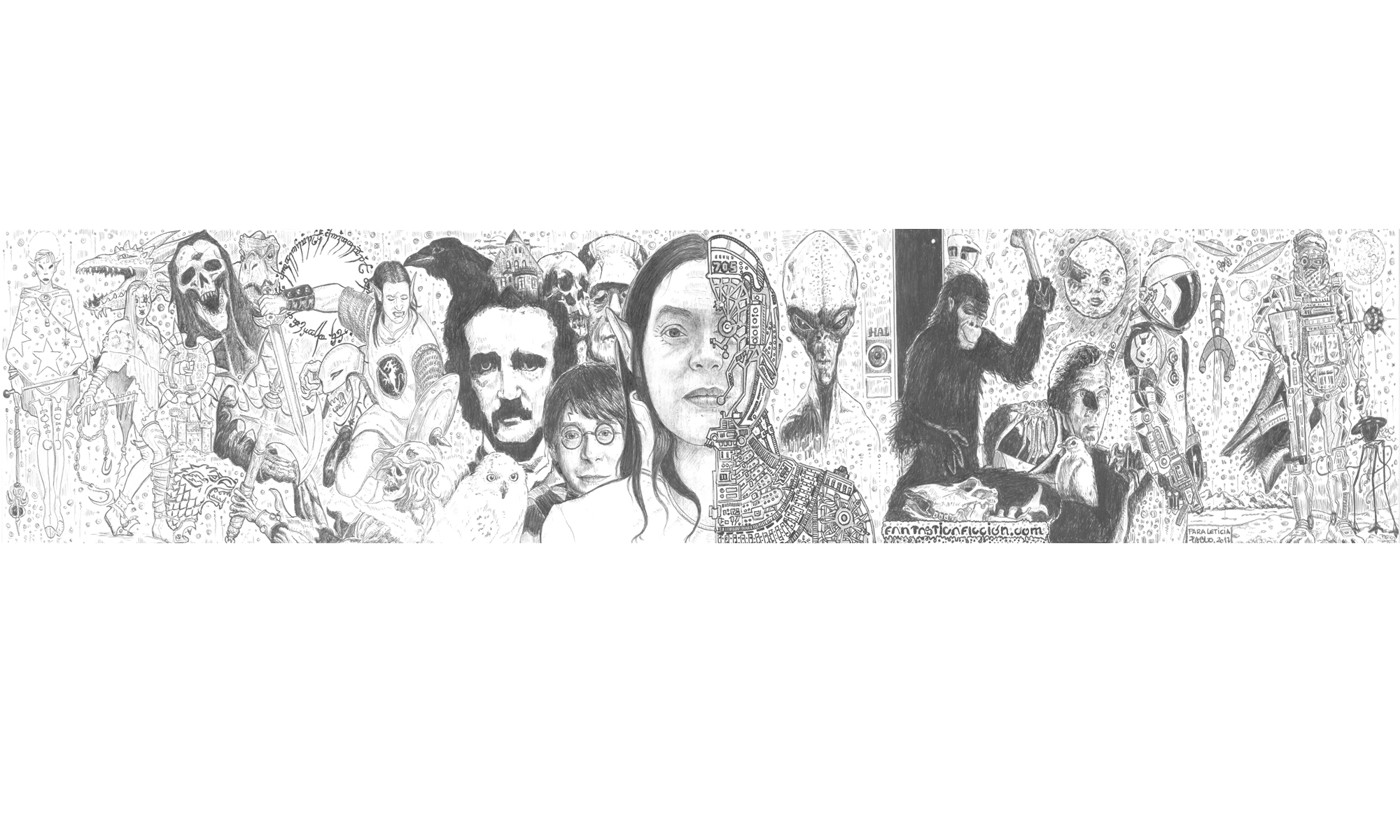
Lecturas de ciencia ficción y fantasía
Se ha desvelado cuál será la portada de The Splinter King, la segunda entrega de la saga The God-King Chronicles, que Orbit publicará en julio.
La portada es obra Anato Finnstark con diseño de Matthew Burne.

Si Adrian Tchaikovksy tuviera que repoblar todos los árboles que se talan para publicar sus libros, antes tendría que inventar una máquina de clonación para que hubiera suficientes personas para llevar a cabo la tarea en un tiempo razonable. Aquí os traigo la que será portada de Elder Race, una novela corta que Tor.com publicará el 16 de noviembre.
Esta es la sinopsis:
A junior anthropologist on a distant planet must help the locals he has sworn to study to save a planet from an unbeatable foe.
Lynesse is the lowly Fourth Daughter of the queen, and always getting in the way.
But a demon is terrorizing the land, and now she’s an adult (albeit barely) and although she still gets in the way, she understands that the only way to save her people is to invoke the pact between her family and the Elder sorcerer who has inhabited the local tower for as long as her people have lived here (though none in living memory has approached it).
But Elder Nyr isn’t a sorcerer, and he is forbidden to help, for his knowledge of science tells him the threat cannot possibly be a demon…
Mi traducción:
Una joven antropóloga en un remoto planeta deberá ayudar a los nativos que ha prometido estudiar para salvarlos de un enemigo imbatible.
Lynesse es la cuarta hija de la reina y siempre está por medio.
Pero cuando un demonio aterroriza la tierra, y ahora que ella es adulta, aunque lo ha sido por poco tiempo y sigue estando siempre por medio, comprende que la única manera de salvar a su gente es invocar el pacto entre su familia y el Antiguo Hechicero que ha habitado la torre desde siempre (aunque nadie recuerda haberse acercado a ella) .
Pero el Antiguo Nyr no es un hechicero y tiene prohibido ayudar, aunque su conocimiento científico le dice que el enemigo no puede ser un demonio…
Esta es la portada, de Emmanuel Shiu:
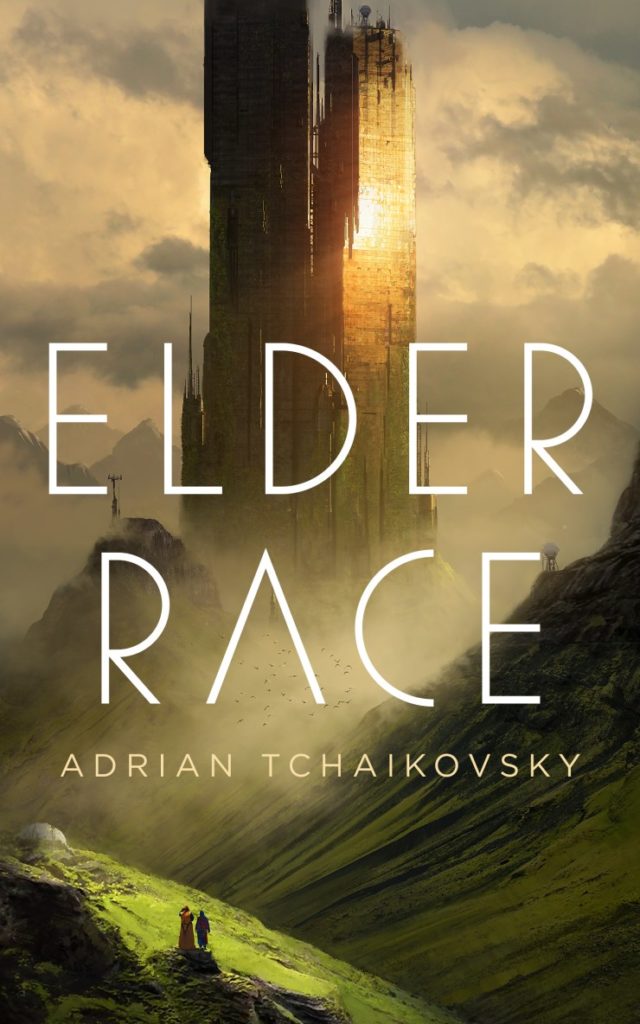
Ya sabemos cuál será la portada del cierre de la trilogía Chronicles of the Bitch Queen, de K.S. Villoso, titulada The Dragon of Jin-Sayeng.
Esta es la sinopsis:
Queen Talyien is finally home, but dangers she never imagined await her in the shadowed halls of her father’s castle.
War is on the horizon. Her son has been stolen from her, her warlords despise her, and across the sea, a cursed prince threatens her nation with invasion in order to win her hand.
Worse yet, her father’s ancient secrets are dangerous enough to bring Jin-Sayeng to ruin. Dark magic tears rifts in the sky, preparing to rain down madness, chaos, and the possibility of setting her nation aflame.
Bearing the brunt of the past and uncertain about her future, Talyien will need to decide between fleeing her shadows or embracing them before the whole world becomes an inferno.
Mi traducción:
La reina Talyien ha llegado a su hogar, pero peligros que nunca habría imaginado esperan en las sombras del castillo de su padre.
Hay guerra en el horizonte. Su hijo ha sido secuestrado, sus señores de la guerra la odian y más allá del mar, un príncipe maldito amenaza con invadir su nación para conseguir su mano.
Peor aún, los secretos de su padres son lo suficientemente peligrosos como para llevarla a la ruina. La magia negra rasga el cielo, preparándolo para una lluvia de locura, caos y la posibilidad de hacer arder la nación.
Enfrentándose a la dureza del pasado y la incertidumbre del futuro, Talyien tendrá que escoger entre huir de sus sombras o aceptarlas antes de que el mundo se vuelva un infierno.
Esta es la portada, con arte de Simon Goinard y diseño de Lauren Panepinto:
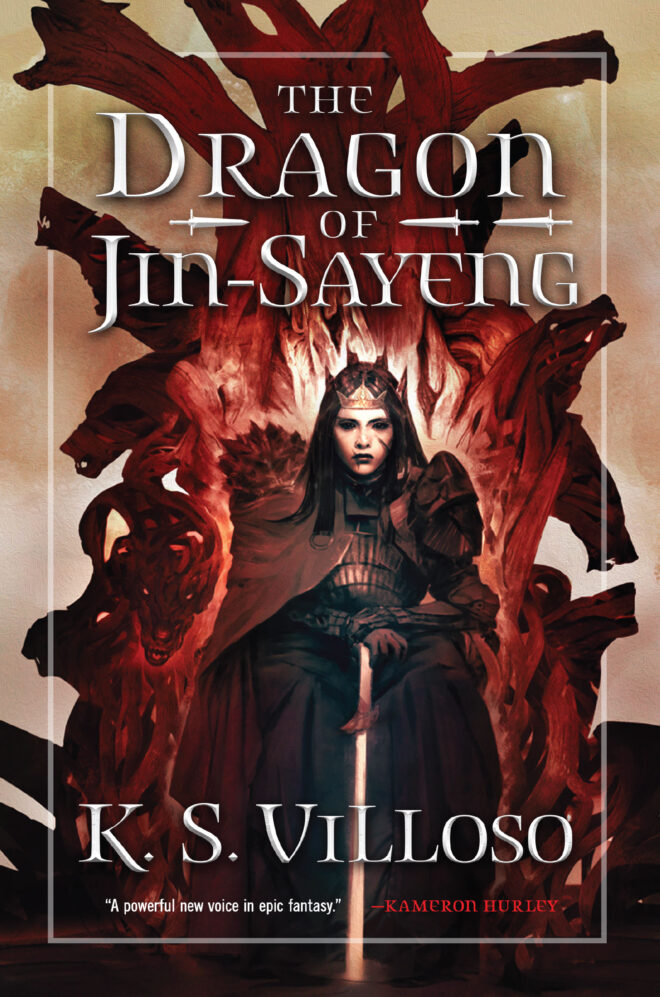
Ya sabemos cuál va a ser la inquietante portada de la novela de debut de Lee Mandelo, Summer Sons, que Tor.com publicará el 28 de septiembre.
La portada es de Sasha Vinogradova con diseño de Christine Foltzer:
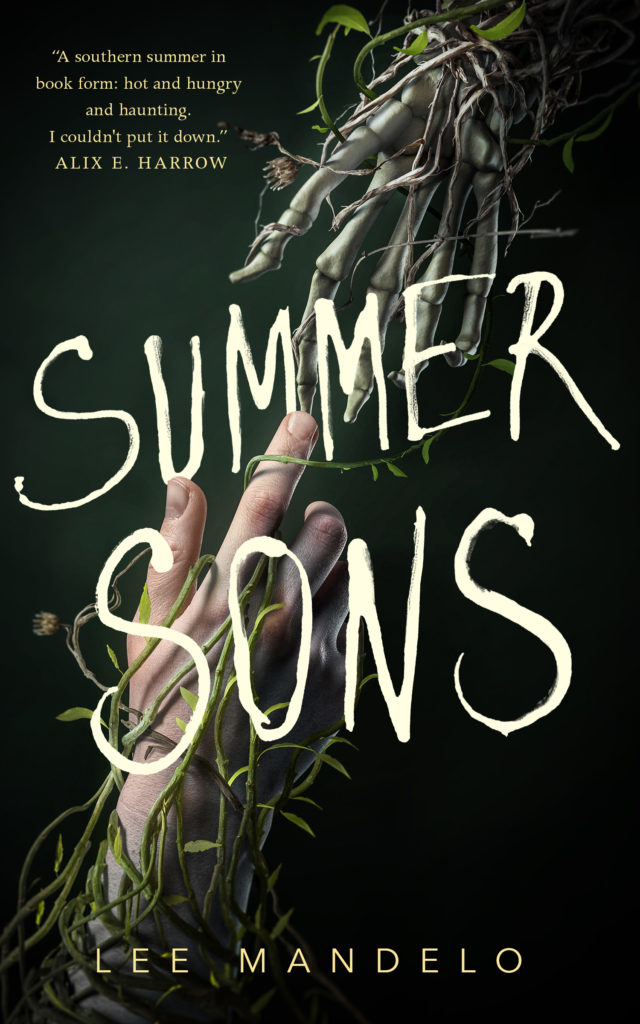
Alix E. Harrow ha conseguido que cada nueva publicación suya sea una noticia, así que aquí os traigo la portada de la que será su nueva novela, A Spindle Splintered, que publicará el cinco de octubre Tor.com.
Esta es la portada, de David Curtis, basada en las ilustraciones originales de Arthur Rackham para la Bella Durmiente:
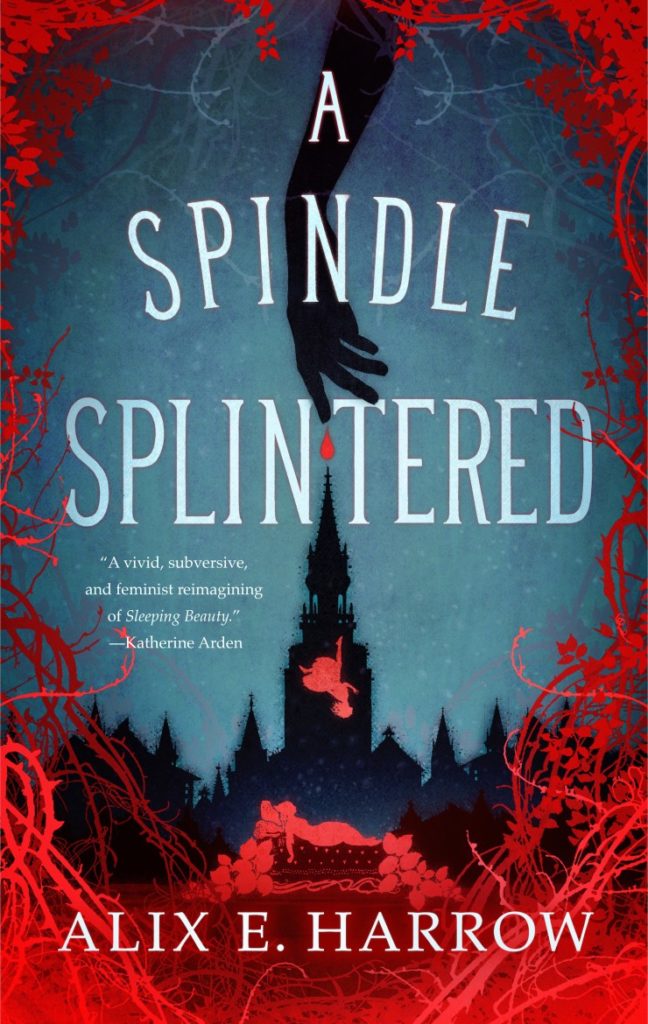
Derek Kunsken sigue caminando con paso firme en su saga Quantum Evolution y nosotros tan contentos de seguir leyéndole. Hace poco se ha dado a conocer cuál será la portada de la tercera entrega, titulada The Quantum War. Solo tenemos que esperar al 12 de octubre para echarle el guante.
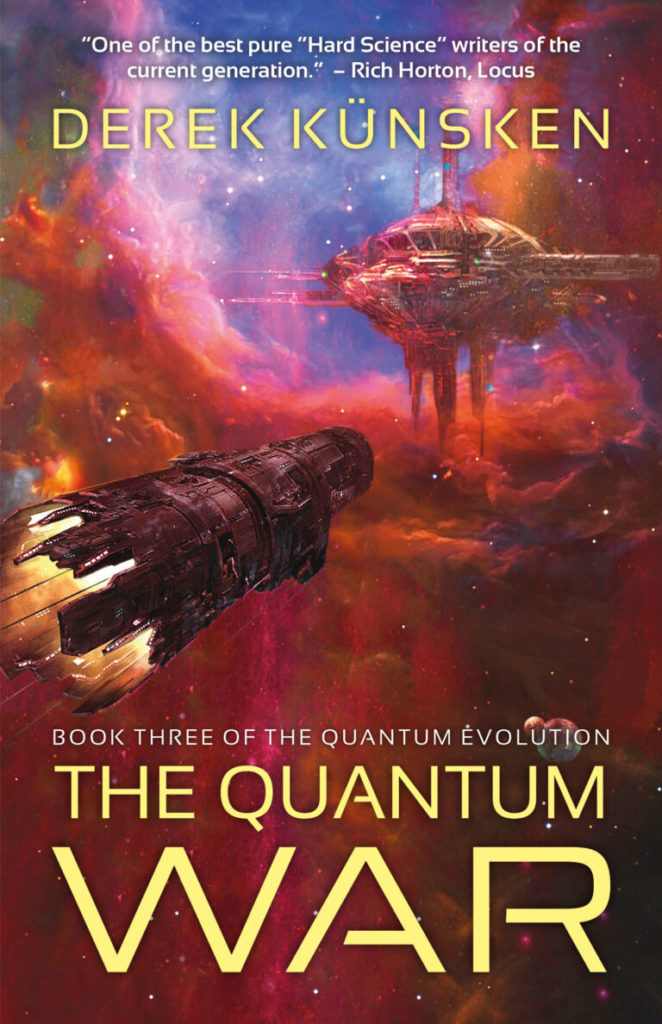
Aquí la sinopsis:
The Union-Congregate war rages onward and the Union’s premier fighter pilots, the Homo Eridanus, start encountering deadly resistance from strange pilots on the Congregate side. Among wreckage, they find that new Congregate pilots aren’t human, but Homo quantus, with strange wiring and AI connections.
At the same time, the Puppets come to the Union with offers of an alliance for a dangerous price: the rescue of the geneticist Antonio Del Casal who is a captive at Venus, with over a hundred Homo quantus.
The only one who might be able to break through the Congregate defences at Venus is a con man who has given up his profession.
Mi traducción:
La guerra entre la Unión y el Congregado continúa y los mejores pilotos, los Homo Eridanus, empiezan a encontrar una resistencia mortífera por parte de unos pilotos desconocidos del lado del Congregado. Entre los restos del combate descubren que los pilotos no son humanos, si no Homo Quantus con conexionados extraños y conexiones con inteligencias artificiales.
Simultáneamente, los Puppets ofrecen una alianza a la Unión, pero exigen un precio: el rescate del investigador genético Antonio Del Casal, prisionero en Venus juntos con una centena de Homo Quantus.
El único que podría introducirse entre las férreas defensas del Congregado en Venus es un timador que dejó atrás su profesión.
Se han anunciado los ganadores de los premios British Fantasy. Son los siguientes:
Mejor novela de fantasía (Premio Robert Holdstock)
The Bone Ships, RJ Barker (Orbit)
Mejor novela de terror (Premio August Derleth)
The Reddening, Adam Nevill (Ritual Limited)
Mejor recién llegado (Premio Sydney J Bounds)
Ta-Nehisi Coates, por The Water Dancer (One World)
Mejor novella
Ormeshadow, Priya Sharma (Tor.com Publishing)
Mejor relato corto
“The Pain-Eater’s Daughter”, Laura Mauro (Sing Your Sadness Deep)
Mejor antología
New Suns: Original Speculative Fiction for People of Color, Nisi Shawl, ed. (Solaris)
Mejor colección
Sing Your Sadness Deep, Laura Mauro (Undertow)
Mejor no ficción
The Dark Fantastic: Race and the Imagination from Harry Potter to the Hunger Games, Ebony Elizabeth Thomas (New York University Press)
Mejor editorial independiente
Rebellion Publishing
Mejor Magazine
Fiyah
Mejor audio
PodCastle (podcastle.org)
Mejor cómic / Novela Gráfica
DIE, Kieron Gillen & Stephanie Hans (Image)
Mejor Artista
Ben Baldwin
Mejor película o serie
Us
Premio Karl Edward Wagner
Craig Lockley
¡Enhorabuena a los ganadores!
A mí es que me pones una nave, una estación o algo en el espacio y ya me tienes ganada, así que imaginaos si me ha convencido la portada de Light Chaser, la obra a cuatro manos entre Peter F. Hamilton y Gareth L. Powell que Tor.com publicará el 24 de agosto.
Aquí la tenéis, obra de Ben Zweifel:
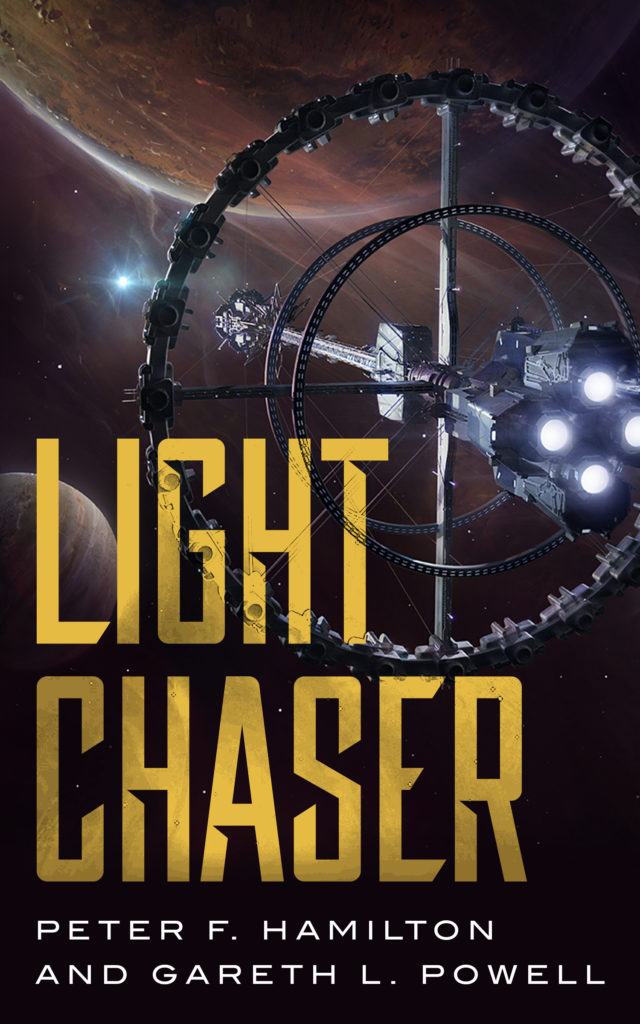
Se han anunciado los finalistas de los premios BSFA de este año, son los siguientes:
Mejor arte:
Fangorn, portadas de la serie Robot Dreams, NewCon Press.
Sinjin Li, portada de A Strange and Brilliant Light de Eli Lee, Jo Fletcher Books.
Iain Clark, Shipbuilding Over the Clyde, arte para la propuesta de Glasgow in 2024 para alojar la WorldCon.
Ruby Gloom, portada de Club Ded de Nikhil Singh, Luna Press Publishing.
Four Black Lives Matter Murals in AR de Nani Walker.
Mejor ficción corta
Eugen M. Bacon, Ivory’s Story, Newcon Press.
Anne Charnock, “All I Asked For”, Fictions, Healthcare and Care Re-Imagined. Editado por Keith Brookes, en Future Care Capital.
Dilman Dila, “Red_Bati”, Dominion: An Anthology of Speculative Fiction From Africa and the African Diaspora, Aurelia Leo. Editado por Zelda Knight y Oghenechovwe Donald Ekpeki.
Oghenechovwe Donald Ekpeki, “Ife-Iyoku, the Tale of Imadeyunuagbon”, Dominion: An Anthology of Speculative Fiction From Africa and the African Diaspora, Aurelia Leo. Editado por Zelda Knight y Oghenechovwe Donald Ekpeki.
Ida Keogh, “Infinite Tea in the Demara Cafe”, Londoncentric, Newcon Press. Editado por Ian Whates.
Tobi Ogundiran, “Isn’t Your Daughter Such a Doll”, Shoreline of Infinity.
Mejor no ficción
Francesca T Barbini (ed.), Ties That Bind: Love in Science Fiction and Fantasy, Luna Press.
Paul Kincaid, The Unstable Realities of Christopher Priest, Gylphi Press.
Andrew Milner y J.R. Burgmann, Science Fiction and Climate Change, Liverpool University Press.
Adam Roberts, It’s the End of the World: But What Are We Really Afraid Of?, Elliot & Thompson.
Jo Lindsay Walton, “Estranged Entrepreneurs”, Foundation: the International Review of Science Fiction.
Jo Walton, “Books in Which No Bad Things Happen”, Tor.com.
Mejor novela
Tiffani Angus, Threading the Labyrinth, Unsung Stories.
Susanna Clarke, Piranesi, Bloomsbury.
M. John Harrison, The Sunken Land Begins to Rise Again, Gollancz.
N.K. Jemisin, The City We Became, Orbit.
Gareth L. Powell, Light of Impossible Stars, Titan Books.
Kim Stanley Robinson, The Ministry for the Future, Orbit.
Nikhil Singh, Club Ded, Luna Press.
Adrian Tchaikovsky, The Doors of Eden, Tor.
Liz Williams, Comet Weather, Newcon Press.
Nick Wood, Water Must Fall, Newcon Press.
¡Enhorabuena a los nominados!
Me hace mucha ilusión poder compartir con vosotros esta entrevista a Nick Martell, el autor de The Kingdom of Liars y The Two-Faced Queen, dos de las novelas de fantasía más interesantes de los últimos tiempos y que me parece que están pasando un poco desapercibidas por aquí. Como siempre, al final podréis ver la entrevista en inglés, para no sufrir mi traducción.
¿Cuál sería tu frase para vender Kingdom of Liars?
Sería la siguiente: “Situada en una ciudad donde el precio de la magia es la memoria, un noble caído en desgracia debe engañar a todos los que están a su alrededor para averiguar si su padre asesinó al príncipe niño”. Obviamente, hay algunos detalles que se han quedado fuera – como la luna destrozada- que un lector solo descubrirá cuando empiecen a leerlo, pero esa frase fue el inicio de todo para mí, con un personaje enfrentado a la ciudad en la que nació y cómo se amolda o reniega de las creencias con las que ha crecido.
¿Quién es tu personaje favorito del libro?
Mi personaje favorito es Naomi Dexter. Es muy divertido escribir sobre ella, sobre su brusquedad, su actitud y su forma de ver la vida, así que tanto sus diálogos como sus características fluyen en la página. Y el hecho de que de forma constante le chille al personaje principal, Michael Kingman, por todo lo que hace es la guinda del pastel.
¿Qué nos puedes decir sobre tu nuevo libro The Two-Faced Queen?
The Two-Faced Queen continúa la historia del infame Michael Kingman mientras gestiona los cambios en su vida tras volverse Mercenario y descubrir la verdad sobre la muerte de su padre. Contiene toneladas de amor, incluyendo pero no limitándose a: asesinos en serie, sistemas de magia expandidos, misterio, amor catastrófico y monstruos mágicos. Estoy muy orgulloso del libro. Creo que es lo mejor que he escrito hasta ahora.
En tus libros hay diferentes tipos de magia, cada una con su coste asociado. ¿Tienes un libro de notas con las peculiaridades de cada sistema? ¿Cómo se te ocurrió que el precio de la magia fueran las memorias?
¡Sí! En el segundo libro The Two-Faced Queen (cuidado pequeños spoilers) se desvela que más variantes de magia en el mundo aparte de las Fabricaciones que Michael conoce en primer lugar. Cada una de ellas tiene un precio que pagar con sus reglas y habilidades asociadas de las que he tenido que llevar cuenta entre bambalinas para saber qué se puede y qué no se puede hacer. Era muy importante para mí cuando empecé a escribir la serie que Michael y sus compañeros no conocieran cómo funciona la magia desde un principio. Pensaba que esto encajaba perfectamente con la idea de que el coste de la magia fueran las memorias de los que la usaban y que precisamente los que ostentan el poder se encontraran en la situación de haber perdido su memoria de tanto usar la magia. Después de todo, ¿por qué querrían los poderosos que la gente supiera cómo funciona la magia? Eso haría que las rebeliones fueran más probables. Por ello, Michael y sus amigos tienen que desvelar los misterios de la magia y sus interconexiones de forma lenta pero segura.
La idea de que el precio de la magia sea la pérdida de la memoria se me ocurrió cuando intentaba saber qué es lo peor que le puedes hacer a un personaje sin llegar a matarlo. Reducirlos a meros fantasmas de sus yos anteriores y quitarles los fundamentos mismos de su personalidad me pareció una buena idea en su momento. Y realmente me da mucho juego para jugar con la forma en que actúan y hablan. Michael probablemente sea mi obra maestra de lo que he tratado de hacer con las pérdidas de memoria y cómo afectan a las personas. Su inmadurez quizá sea lo que más llama la atención cuando ves lo que estoy haciendo con él como personaje. ¿Es Michael inmaduro de por sí o es inmaduro porque no puede dejar el pasado atrás debido a que la magia ha borrado sus memorias?
Esto lo dejo a la interpretación del lector.
Hay cierta controversia sobre la figura del protagonista, Michael Kingman. O le amas o le odias. ¿Por qué crees que sucede esto?
Esta es una buena pregunta, nadie me la había hecho antes. Lo voy a intentar explicar de la manera más concisa posible.
De forma simple, Michael es una persona rota mentalmente. Se ha criado en una sociedad muy manipuladora que le odiaba solo por tener el valor de existir y le forzó a desarrollar mecanismos de adaptación para sobrevivir. Ser respondón, insubordinado y cierta obsesión con algo que no merece pero a lo que se aferra como si fuera a salvarle de todo el odio a su alrededor.
Cuando escribo a Michael, lo trato como alguien que se odia a sí mismo y que piensa que no merece la comprensión de los demás y esto queda reflejado en la narrativa. No intenta que el lector se sienta como él o que le tenga lástima, solo quiere que comprenda por qué hizo lo que hizo. Me parece que estar en la cabeza de alguien así puede ser difícil para el lector. En un nivel muy básico, queremos empatizar y estar a favor de los personajes sobre los que estamos leyendo, pero Michael, como personaje, no quiere justificar sus acciones porque sabe que son egoístas y erróneas. Solo quiere algo de paz y felicidad para sí mismo.
Las elecciones narrativas que escogí para Michael siempre iban a depender de cuánto confiaba el lector en mí como escritor. Si no lo hacen, creerán que cometí un error con Michael. Que debería haberle hecho más empático. Y aquellos que confíen en mí hasta cierto punto, verán más allá de lo que dice Michael y se fijarán en lo que oculta. Michael miente mucho, pero sobre todo mediante omisiones. Así pues, los detalles sobre los que no habla son más importante que aquellos sobre los que sí lo hace. Siempre he sabido que contar una historia en primera persona alienaría a algunos lectores y hacerlo en tercera persona les allanaría el camino a estos lectores pero… quería contar el relato de Michael de una forma determinada. Creo que los personajes con fallos son divertidos e interesantes.
Y, para ser honestos, normalmente no me gustan los protagonistas, así que, ¿por qué no crear al protagonista más odiado de todos los tiempos?
La familia, el honor y la amistad son muy importantes para el protagonista de tu serie. ¿Por qué decidiste que estas fueran las principales motivaciones de Michael Kingman?
Cuando estaba creando a Michael, estaba muy interesado en huir del típico protagonista de saga fantástica como su historia de paso a la madurez que no se detiene ante nada para conseguir lo que desea. Venganza, poder y un deseo de cambiar el mundo es lo que mueve a estos personajes normalmente, así que Michael se creó de forma opuesta estos estereotipos. Dato curioso: Dark es casi la representación perfecta de lo que estaba tratando de evitar con Michael y es el favorito de muchos lectores. ¿A que es divertido?
De todas formas, la familia y los amigos de Michael son importantes para él, pero como mucha gente de su edad con su nivel de madurez sabe cuáles son las palabras adecuadas pero no siempre le siguen las acciones correctas. Mientras se va desarrollando, siempre quise que Michael tuviera un punto hipócrita y que madurara en alguien que personificara aquello sobre lo que hablaba más que justificar sus acciones cuando hace algo que va contras sus creencias más profundas. Para todo el odio que recibe, siempre me sorprende que nadie mencione que no deja que este odio le consuma. Y, honestamente, creo que eso es algo especial y extraño. Ser capaz de perdonar no es algo que se valore tanto como debería.
Tu primera novela se publicó cuando tenías 26 años. ¿Crees que es más difícil que te publiquen siendo tan joven?
Creo que como todas las cosas tiene sus ventajas y sus desventajas. Es agradable estar haciendo esto tan joven de forma que puedo crecer constantemente, aprender y mejorar mi escritura con gente muy experimentada en el negocio para guiarme. Y con tanto tiempo, sé que lo que estoy escribiendo ahora mismo solo es la superficie de lo que seré capaz de hacer en el futuro.
Pero al mismo tiempo, puede ser estremecedor. Entrar en el mundo de la publicación tan joven y sin mucha experiencia en el negocio me hizo pensar que todo era de color de rosa y no fue así. En un negocio como otro cualquiera y eso significa que hay muchas cosas malas que aparecen en otros negocios también existen aquí (celos, politiqueo, mezquindades, favoritismos, camarillas…) pero cuando se deshace de todo esto y es solo gente hablando de sus historias favoritas y animando a los demás las partes malas son menos importantes.
Respecto a si es más difícil que te publiquen siendo joven o no… es difícil de decir. Tuve suerte. Mi agente también lo cree. Le mandé la historia correcta en el momento correcto y quién sabe dónde estaría yo si hubiera mandado la novela un año antes o un año después. Y da igual lo bueno que seas, muchas veces todo se reduce a una cuestión de suerte. Para aquellos que quieran hacer lo mismo que yo, les animo a seguir intentándolo. Seguid leyendo y escribiendo. Solo hace falta una persona que crea en tu trabajo y lo conseguirás también. O intentar la autopublicación. Este camino es más recomendable ahora que nunca.
Tus libros tienen una versión en audiolibro. ¿Qué opinas de esta forma de leer?
¡Me encantan los audiolibros! No los escucho mucho en la actualidad porque ahora no viajo apenas, pero me encanta ponerme uno para un largo viaje en coche, en tren o en avión o incluso cuando hago tareas de casa. Escuchar las voces de actores talentosos cuando les dan vida a mis personajes es estupendo. Me emociono cada vez que pasa. Es poder volver a disfrutar de una historia de nuevo y es raro porque cuando un libro se publica puede que ya lo haya leído cientos de veces.
¿Te ha contactado alguna editorial española interesada en tu trabajo?
Desgraciadamente no ha sido así de momento. Me encantaría ver mi libro en español, pero eso escapa de mi control. ¡Esperemos que sea posible algún día! Quizá cuando las cosas se calmen en el panorama internacional.
¿Sueles ir a convenciones? ¿Qué te parecen?
Las convenciones son maravillosas y agotadoras al mismo tiempo. Me encanta interactuar con otros autores, lectores, gente del mundillo y estar en mesas redondas para hablar de fantasía, películas, juegos y cualquier cosa de la que tenga oportunidad. Aunque siempre me parece que al final necesito una buena siesta o tres. Pero voy siempre que tengo oportunidad porque he conocido a mis mejores amigos en el mundo editorial en ellas. ¡Incluso conocí a mi agente en una! No puedo recomendar lo suficiente asistir a convenciones, de ser posible. No digo que te arruines para ir solo porque pienses que te va a dar una puerta de entrada en la industria. Hay muchos otros métodos para eso en la actualidad.
¿Hay algo más que nos quieras comentar? ¿Qué nos puedes decir sobre tus nuevos proyectos?
Sí, lo siguiente en lo que estoy trabajando es el libro 3 de Legacy of the Mercenary Kings. Estoy muy emocionado con escribir este libro porque por fin saldremos de la ciudad de Hollow y verán el mundo exterior. Esto es algo de lo que solo hemos tenido indicios hasta ahora y va ser espectacular mostrar por fin qué más hay: estatuas en el mar, bestias extrañas, más sistemas mágicos, ruinas apocalípticas y algún que otro nuevo inmortal. Espero que le guste a todo el mundo.
Aparte de esto, gracias por entrevistarme. Me lo he pasado muy bien. Espero que lo podamos hacer otra vez cuando salga el tercer libro.
Muchas gracias de nuevo a Nick por contestar a nuestras preguntas. Os recomiendo mucho sus libros. A continuación podréis leer la entrevista en inglés.
What would be your sales pitch for Kingdom of Liars?
So, the sales pitch for The Kingdom of Liars was “Set in a city where magic costs memories to use, a disgraced noble must deceive all around him to determine whether his father murdered the child prince.” Obviously, there are some details I’m leaving out—like the shattered moon—that a reader will only discover once they start it, but that sentence really was what started it all for me with it being a character against the city they were born in and how they shape or reject what they’ve grown up believing in.
Who is your favourite character from this book?
My favourite character from the book is Naomi Dexter. She’s such a fun character to write in terms of her bluntness, attitude, and overall outlook on life that her words and characteristics always flew onto the page for me. And the fact she routinely yells at Michael Kingman, the main character, for his actions is just the icing on top of the cake for me.
Can you tell us something about your new book The Two-Faced Queen?
The Two-Faced Queen continues story of the infamous Michael Kingman as he deals with the changes in his life after becoming a Mercenary and discovering the truth about his father’s death. There’s tons to love in it—including and not limited to—serial killers, expansive magic systems, mystery, catastrophic love, and magical monsters. I’m incredibly proud of the book. I think it is the best thing I’ve written so far.
In your books there are very different kinds of magic, each of them with a cost. Do you have a “guidebook” with the rules of each magic system? How did you come with the idea of paying magic with memories?
Yes! So—and this is light spoiler territory—it is revealed in The Two-Faced Queen that there are multiple variations of magic in the world besides Fabricating that Michael learns about in the first. Each of them has a unique cost with rules and abilities that I have been keep track of behind the scenes to dictate what the characters can and can’t do with their magic. It was important to me when I started writing the series that Michael and his friends were never going to have complete knowledge of how their magic—and other magic worked—until much later on. I always thought this kind of fit well with the world they lived in being influenced by those in power that lost their memories the more they used it. After all, why would people in control want other people to know how magic worked? Rebellions would be more likely. And so, Michael and friends slowly but surely try to unravel the mysteries of magic and how it all connects.
The idea of magic costing memories was pretty much created because I tried to think of the worst thing I could do to a character without killing them. Reducing them to shells of their former selves and taking out the building blocks of their personality seemed to be a good idea at the time. And it honestly gives me a lot of room to play around with how characters act and talk. Michael himself is probably the magnus opus of what I’ve tried to do with memory loss and how it affects someone. His immaturity is probably the easiest thing to see when it comes to what I’m doing with him. Is Michael always immature or is he immature because he can’t move on from the past thanks to magic erasing his memories?
I’ll leave that up to the reader to determine.
There is a certain controversy about the figure of the main protagonist, Michael Kingman. Either you love or you despise him. Why do you think this can be happening?
Oh! This is a fun question. No one’s asked me it before. I’ll try to do my best to explain why I think Michael is controversial as concisely as possible.
To put it plainly, Michael is a very broken person mentally. He’s been raised in a manipulative society that hated him just because he had the gall to exist, and it forced him to develop coping mechanisms to survive. Talking back, insubordination, and an obsession with something he doesn’t deserve but clings to as if it’ll save him from all the hate.
When I write Michael, I treat him as someone who hates himself and doesn’t think he deserves sympathy and so that’s reflected in the narrative. He doesn’t try to make the reader like him or feel bad for him, just understand why he did what he did. I think being in the head of someone like that can be jarring for a lot of readers. On a basic level, we want to root for the people we’re reading about but Michael, as a character, doesn’t want to justify his actions because he knows they’re wrong and selfish. He just wants to find some basic level of happiness and peace.
The narrative choices I made for Michael were always going to be dependent on how much the reader trusted me as a writer. If they don’t, they’ll think I made a mistake with Michael. That I should have made him more sympathetic. And those who do trust me some degree, look beyond what Michael’s saying and focus on what he’s not. Michael lies a lot, but a lot of it is through omission. So, the details he doesn’t talk about are more important than what he does. I’ve always known that telling the story in first person would alienate some readers and having it in third person would be easier, but…I wanted to tell Michael’s story a certain way. I think flawed characters are fun and interesting.
And to be honest, I usually dislike main characters anyway so why not create the most hated main character of them all?
Family, honor and friendship are very important for the main character of the series you are writing. Why did you choose to take these three characteristics as the main motivations of Michael Kingman?
When I was creating Michael, I was really interested in trying to get away from the typical fantasy protagonist in a coming-of-age story that stops at nothing to get what they desire. Revenge, power, and a desire to change the world are usually what drives those characters, so Michael was created as an opposition to those kind of stereotypes. Fun fact: Dark is almost a perfect representation of what I was trying to avoid with Michael and he’s a decent amount of reader’s favourite character. Funny, isn’t it?
Anyway, Michael’s family and friends mean a lot to him, but like a lot of people his age and at the same maturity level he knows the right words to say but doesn’t always follow through with the right actions. As he develops, I always wanted Michael to be slightly hypocritical and mature into someone who personified what he talked about rather than justifying his actions when he does something that goes against his core beliefs. For all the hate Michael gets, I was always surprised that no one mentions that at his core he chose not to let hate consume him. And, honestly, I think that’s really special and rare. Forgiveness isn’t something that’s held up to as high standards as it ought to be.
Your first novel was published when you were 26 years old. Do you think it is more difficult to be published being so young?
I think like all things it comes with a unique set of advantages and disadvantages. It’s nice to be doing this so young so that I can constantly grow and learn and improve my craft with so many experienced people in the business to guide me. And with so much time, I know what I’m writing now is just scratching the surface of I’ll be able to do in the future.
But at the same time, it can be jarring. Entering publishing so young and without as much worldly experience as others in business left me thinking it was going to be more rose coloured then it ended up being. It’s a business like anything else and that means all of the nonsense that comes with any other industry is prevalent in this one as well—jealousy, politics, pettiness, favouritism, cliques, etc—but when it breaks away from all that and just becomes people talking about their favourite stories and supporting each other it makes all the bad parts less annoying.
As for it being more difficult to be published young or not…it’s hard to say. I got lucky. My agent will say that as well. I sent him the right story at the right time and who knows if I would be here if I had sent it a year earlier or a year later. And no matter how good you are a lot of it does come down to luck. For those who want to do the same as me, just keep trying. Keep writing and reading. All it takes is one person to believe in your work and champion it for you to end up here as well. Or look into self-publishing. That route is more recommended than ever.
Your books have an audiobook version. What do you think about this way of reading?
I love audiobooks! I don’t listen them to as much anymore due to a lack of commute currently, but I really enjoy turning one on a long car ride, train ride, or plane trip or if I’m doing chores. Listening to talented voice actors bring my characters to life is amazing. I’m in awe every time it happens. It’s kind of like being able to experience the story again which is really rare since by the time a book goes to print I’ve probably read it hundreds of times.
Have you been contacted by a Spanish publisher interested in your work?
Sadly, not at this moment. I would love to have a Spanish version, but things are out of my control right now. Hopefully one day soon! Maybe once things calm down internationally.
Is there anything else you would like to comment? What can you tell us about your new projects?
Yeah, the next thing I’m working on is book 3 of the Legacy of the Mercenary Kings. It’s an exciting book to write because I finally take the readers out of the city of Hollow and they get to see the greater world for the first time! It’s been something they’ve only really had hints at before now and it’s going to be so cool to finally show what else is out there: seas of statues, weird beasts, more magic systems, apocalyptic ruins, and some new immortals. I hope everyone enjoys it!
Other than that, thanks for having me! This was a really fun interview! Hopefully we get to do it again when the third book comes out.
Do you usually go to conventions? What do you think about them?
Conventions are wonderful and exhausting all at the same time. I love interacting with other authors, readers, industry folk, and being on panels to talk about fantasy, movies, games, and whatever else I get the chance to. Even though it always seems like by the end I need a good nap or three. But I’ll always go to them when I get the chance because I’ve met some of the closest friends I have in publishing thanks to them. And I met my agent at a convention! I can’t recommend going to them enough if it’s feasible for you. Obviously don’t break the bank to try and get to one just because you think it’ll help you break into the industry. There’s plenty of methods to do that nowadays.